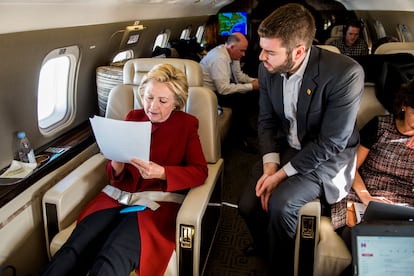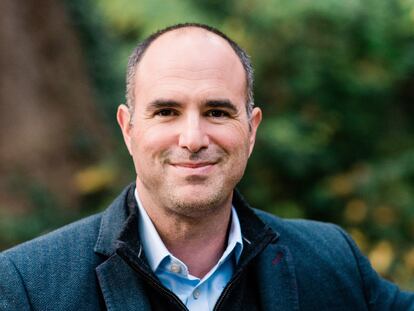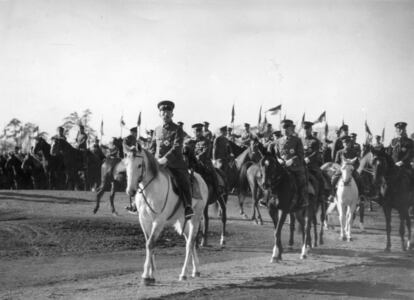What might have been: Hillary Clinton’s 2016 victory speech and other addresses that were never delivered
Political speechwriter Jeff Nussbaum’s new book reviews the content and context of some 20 speeches that never saw the light of day


On election night 2016, Hillary Clinton’s victory speech to celebrate her defeat of Donald Trump had a conciliatory message: “We will no longer be an ‘us versus them’ country. The American dream is big enough for everyone.” President Dwight Eisenhower’s apology for the Allies’ failure at Normandy on June 6, 1944, ended by saying, “[The soldiers] did all that bravery and devotion to duty could do. If any blame or fault attaches to the attempt it is mine alone.” At the height of the Cuban missile crisis, in October 1962, John Kennedy’s address justified a difficult decision to his “fellow Americans” in the following way: “With a heavy heart, and in necessary fulfillment of my oath of office, I have ordered – and the United States Air Force has now carried out– military operations, with conventional weapons only, to remove a major nuclear weapons build-up from the soil of Cuba.
Unless you’ve just awakened from a decades-long coma, you know that Clinton didn’t become the first female president in US history in 2016; the Nazis didn’t win on D-Day; and Kennedy didn’t bomb Cuba. But speeches for those occasions did exist. Written in anticipation of what might have been, all three addresses are included in Jeff Nussbaum’s book Undelivered: The Never-Heard Speeches That Would Have Rewritten History (Flatiron Books). In it, Nussbaum reviews the content and context of some 20 speeches that never saw the light of day for different reasons: because situations changed quickly, their authors had second thoughts, history took a dramatic turn, or death prevented the speakers from delivering them. The tome features pronouncements that Albert Einstein, Pius XI, Roosevelt, Kennedy – who was scheduled to speak to the troops in Dallas on the day he was assassinated – and other figures could have made but ultimately didn’t.

A professional speechwriter “for 25 years,” Nussbaum reveals how Richard Nixon would have announced his decision not to resign (plagued by the Watergate scandal, he finally stepped down in 1974); how Emperor Hirohito might have apologized in 1948 for having gotten the Japanese involved in World War II; and how Edward VIII intended to refuse to abdicate the British throne in 1936, after his relationship with Wallis Simpson became public knowledge.
“I see the world through speeches,” the author explained in early August in an interview with EL PAÍS by videoconference. “Anyone who does this [work] knows that for almost every speech that is delivered another one ends up shelved; I was interested in the latter,” he added. He shared a typical speechwriter’s joke. A speechwriter dies and asks St. Peter to show him hell and heaven, in that order. The former is full of guys like him, writing to beat a deadline. “That’s my worst nightmare!” he exclaims. The scene is the same in heaven. “But this is the same as hell,” he complains. St. Peter replies, “No way! Here, we use what they write.” Nussbaum’s obsession with undelivered speeches began “late in the evening of November 7, 2000, election night.” He had started working with then-vice president Al Gore when he was “fresh out of college.” As Nussbaum recalls, “that day, we wrote as many as three different speeches that he never delivered.” After his time with Gore – who lost that election – ended, he went on to write speeches for other politicians. Most recently, he served as a speechwriter for President Joe Biden (Nussbaum left the job shortly before publishing his book). Of his most recent boss, he says that “[Biden] has always surrounded himself with good prose writers, like Antony Blinken [who wrote for him and is now his Secretary of State] and Bruce Reed [his current Deputy Chief of Staff]. We worked in a team of five or six writers. Sometimes [we wrote] in advance. Other times, there’s no choice but to hurry and react to a particular event. A speech passes through many hands, and several advisors review it once it is written, but ultimately the speaker decides what to say.”

A video shown at the January 6 congressional committee’s eighth session clearly illustrated that point. In it, Donald Trump reads a clumsy apology from a teleprompter the day after the Capitol was attacked. “I don’t want to say that the election is over,” the businessman said in the recording. In an email after our interview, Nussbaum noted that the clip provided a closer look at how the speechwriter’s job really functions: “When a leader sees and has to say the words that have been prepared for him, the debates end and the internal discussions and nebulous ideas become real. There, it became clear that Trump still could not accept the reality that he lost, nor [could he] condemn the insurgents who were desecrating our democracy on his behalf.”
Of the current president’s oratory skills, Nussbaum diplomatically says that Biden “prefers to adopt a conversational tone: he wants to come across as approachable, to make people understand his accomplishments. Some people like that more than others.” Nussbaum avers that Trump “tends to improvise more.” The speechwriter adds that “it’s been shown that the average American reads and processes language at the level of an eighth grader [13-14 year olds]. [Trump] expresses himself like a fourth grader [eight to nine-year-olds]; of the last 15 presidents, that’s the lowest level. Inevitably, it helps him to connect with a lot of people.”
Undelivered can be read in several different ways. It offers a brief introduction to the history of rhetoric as old as American democracy itself: “Alexander Hamilton helped George Washington write [speeches],” Nussbaum says of the founding fathers. However, “the first person considered a ‘presidential speechwriter’ was a journalist named Judson Welliver, hired in the 1920s by [Republican] Warren G. Harding as a ‘literary clerk.’”
Nussbaum’s book also provides advice on the art of fusing politics and prose. For example, superstition dictates that concession speeches should be written whenever victory speeches are penned. Nussbaum urges us to avoid passive constructions because they denote a lack of leadership. He says that one must recognize that impactful public speaking depends on the writing as well as the occasions on which it occurs. Finally, he reminds us that speeches have two audiences, the one in the auditorium where they’re delivered and the one outside, as “represented by the cameras and reporters at the back of the room.”
Perhaps Nussbaum’s most important counsel is to be modest, lest David Frum’s fate (he’s now a senior editor at The Atlantic magazine) befall you. He quit his job at George W. Bush’s White House after his wife bragged that Frum had coined the felicitous phrase “axis of evil.” “You don’t go into this [line of work] to be enchanted by your own words,” Nussbaum said in the interview. The work is about helping the person for whom you’re writing to bring out the best version of themselves.” That’s why, Nussbaum adds, it’s important to establish a bond with the people you’re writing for (he spends a lot of time studying “how [his clients] think, how they argue”). However, it’s not essential to do so: the book also highlights the case of Peggy Noonan, who brilliantly crafted Ronald Reagan’s rhetoric (“a sensational reader”), even though she barely knew him.
Does a speechwriter have to believe in the ideas that s/he expresses for others? “You could say that speechwriters are like lawyers: they can defend either side,” Nussbaum explains. “In the United States, everyone is entitled to a lawyer, but not everyone is entitled to a speechwriter. So, as a general rule, you’ll do your job better if you agree with the speaker’s arguments, even if just in a broad sense.”
Written clearly and persuasively by someone who spent decades polishing others’ prose, the book offers an original contribution to the many works analyzing important figures’ inspired words. But it differs from other studies in that it calls to mind the Marvel comic series What If?, which revisits the fate of superheroes and asks what would have happened to them if events had gone differently. Nussbaum wasn’t familiar with What If? before publishing his book, so he prefers another pop culture reference. He defines his project as a journey “into the multiverse of the madness of words.”
Such counterfactuals raise the question of what would have occurred if Gore had defeated George W. Bush in 2000. “Gore was very clear about the threat that Al Qaeda and Osama bin Laden posed. Bush was not,” he argues. “What did Bush do after the attacks on the Twin Towers in September 2001? He told Americans to go out and shop. Literally, [he called on them] to bolster the economy. Gore would have abandoned our dependence on Saudi oil, a product that was destroying the planet and used to fund those who attacked us.”
Nussbaum’s response connects to one of his book’s most fascinating chapters: the speech that Condoleezza Rice, George W. Bush’s National Security Advisor at the time (and later Secretary of State), was scheduled to give at the National Press Club in Washington on 9/11 but never did. She planned to argue that the US should focus on strengthening its missile defense, unaware that terrorists had chosen that very day to turn four commercial airliners into deadly missiles. “It shows that Bush and his administration were completely wrong about the real threats to the country’s security,” the author concludes.
Tu suscripción se está usando en otro dispositivo
¿Quieres añadir otro usuario a tu suscripción?
Si continúas leyendo en este dispositivo, no se podrá leer en el otro.
FlechaTu suscripción se está usando en otro dispositivo y solo puedes acceder a EL PAÍS desde un dispositivo a la vez.
Si quieres compartir tu cuenta, cambia tu suscripción a la modalidad Premium, así podrás añadir otro usuario. Cada uno accederá con su propia cuenta de email, lo que os permitirá personalizar vuestra experiencia en EL PAÍS.
¿Tienes una suscripción de empresa? Accede aquí para contratar más cuentas.
En el caso de no saber quién está usando tu cuenta, te recomendamos cambiar tu contraseña aquí.
Si decides continuar compartiendo tu cuenta, este mensaje se mostrará en tu dispositivo y en el de la otra persona que está usando tu cuenta de forma indefinida, afectando a tu experiencia de lectura. Puedes consultar aquí los términos y condiciones de la suscripción digital.








































